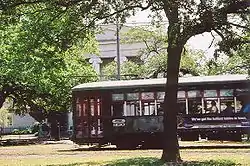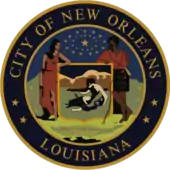16th Ward of New Orleans
The 16th Ward or Sixteenth Ward is a division of the city of New Orleans, Louisiana, one of the 17 Wards of New Orleans. New Orleans Districts and Wards. It is an Uptown ward, along with the adjacent 17th Ward formerly part of the city of Carrollton, Louisiana, annexed by New Orleans in the 1870s. The Ward stretches inland from the Mississippi River, with the upper boundary being Carrollton Avenue, across which is the 17th Ward, and the lower being Lowerline Street, across which is the 14th Ward. The back boundary was the New Basin Canal, now part of the route of I-10.[1]

Neighborhoods and landmarks
Going from the Riverfront back, the Ward includes part of the Mississippi River levee used as a linear park. Atop a section of the levee is the regional office of the U.S. Army Corps of Engineers. Across Leake Avenue (still called "River Road" by many locals) is the Black Pearl neighborhood. The Ward continues back across St. Charles Avenue, route of the famous St. Charles Avenue Streetcar. The Old Carrollton Courthouse formerly served as a courthouse and school, but is now vacant. The Lower or East Carrollton neighborhood contains much fine wooden 19th century residential architecture, and Maple Street, an old mixed commercial/residential neighborhood main street, with shops, restaurants, bars, and coffee shops, is popular with both locals and students of nearby Tulane University and Loyola University New Orleans. The old residential neighborhood with occasional corner stores continues back to wide Claiborne Avenue, across which is the upper edge of the Fountainbleau neighborhood, and on Carrollton Avenue the Notre Dame Seminary is the residence of the Archbishop of New Orleans, where Pope John Paul II stayed during his visit to New Orleans. Back from Earhart Boulevard was the former location of Lincoln Park and Johnson Park, where musicians including Buddy Bolden, Bunk Johnson, and John Robichaux played in the early years of the 20th century, now a mixed commercial and residential area. The Gert Town neighborhood continues back to Xavier University of Louisiana at the back end of the Ward adjacent to I-10.
Hurricane Katrina
In the general flooding of New Orleans in the aftermath of Hurricane Katrina in 2005, most of the ward from about Green Street back was flooded, while most of the area from around Freret Street to the Mississippi River was above the flood waters. The dry area experienced extensive looting in the aftermath of the storm and levee failure.
The area was hit in February 2007 by a freak tornado that tossed a stretch of Hillary Street before bouncing across St. Charles Avenue and Carrollton Avenue near Jeannette Street.
References
- New Orleans Districts Archived July 1, 2010, at the Wayback Machine
| Wikimedia Commons has media related to 16th Ward of New Orleans. |
